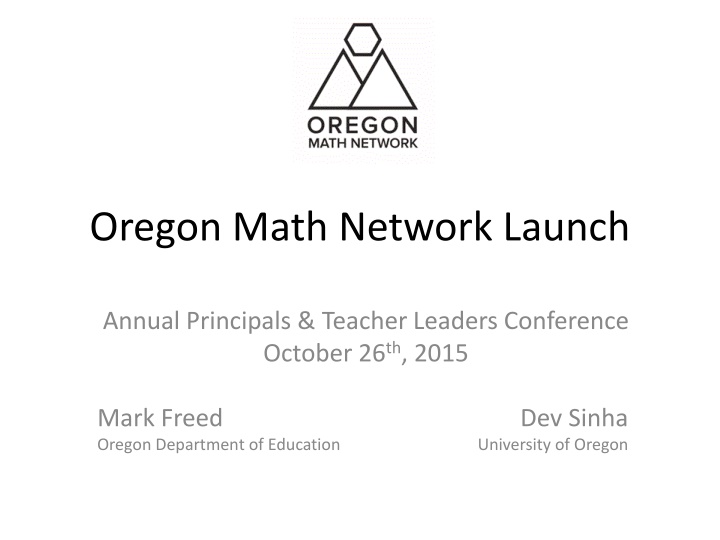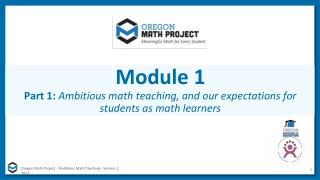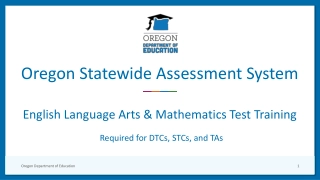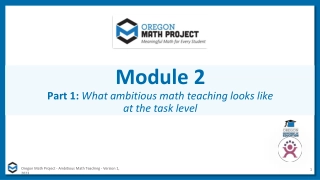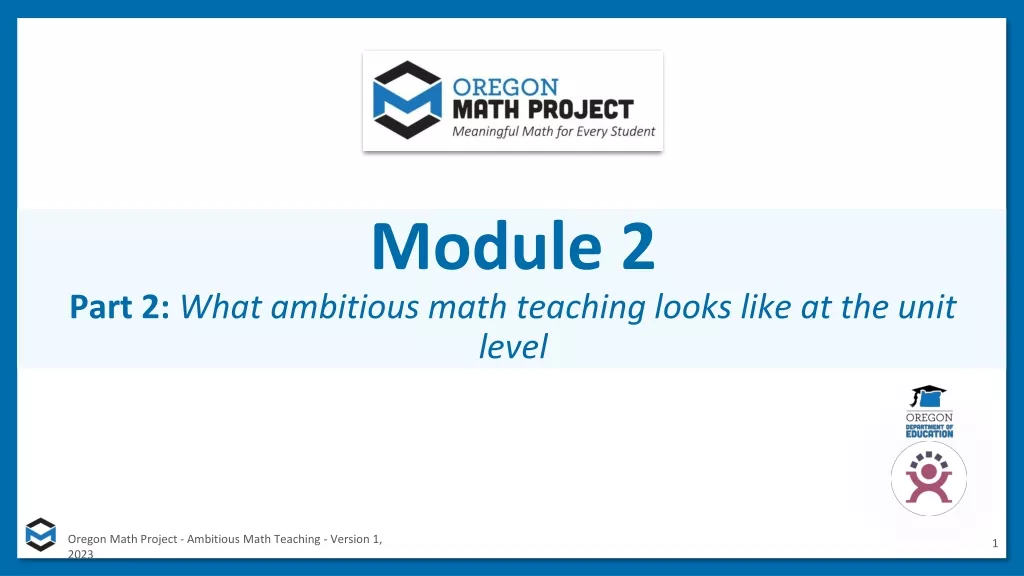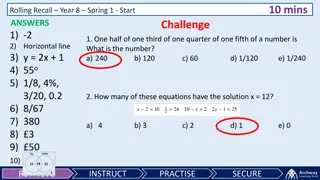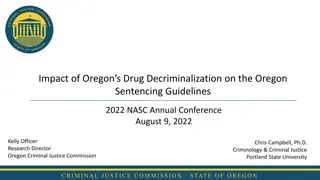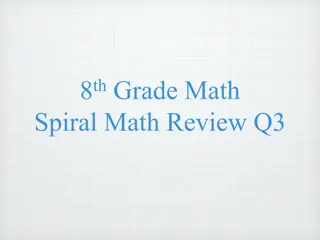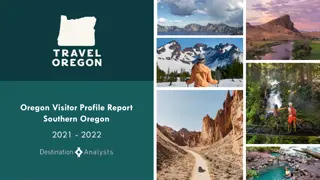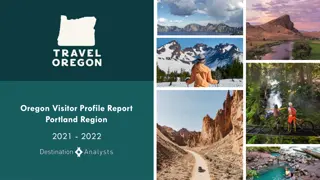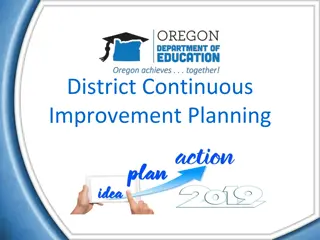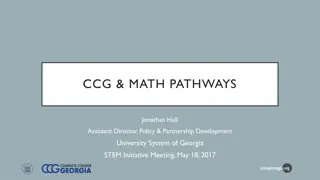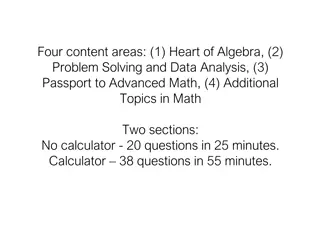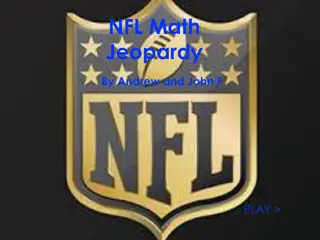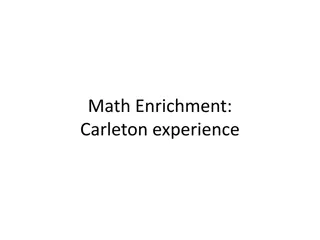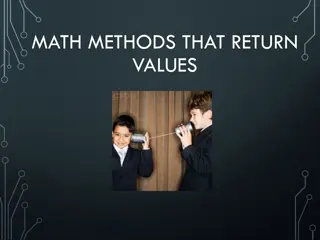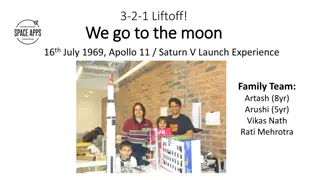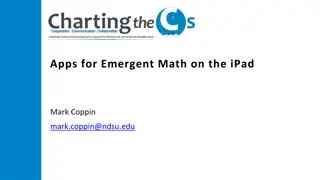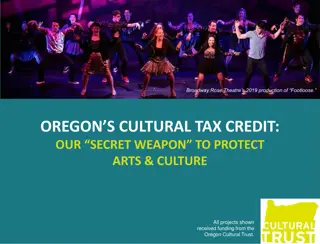Oregon Math Network Launch Conference
"Annual Principals & Teacher Leaders Conference focused on promoting skilled, knowledgeable, and well-supported teachers in math classrooms across Oregon. Emphasis on collaboration, problem-solving, and best practices."
Download Presentation

Please find below an Image/Link to download the presentation.
The content on the website is provided AS IS for your information and personal use only. It may not be sold, licensed, or shared on other websites without obtaining consent from the author.If you encounter any issues during the download, it is possible that the publisher has removed the file from their server.
You are allowed to download the files provided on this website for personal or commercial use, subject to the condition that they are used lawfully. All files are the property of their respective owners.
The content on the website is provided AS IS for your information and personal use only. It may not be sold, licensed, or shared on other websites without obtaining consent from the author.
E N D
Presentation Transcript
Oregon Math Network Launch Annual Principals & Teacher Leaders Conference October 26th, 2015 Mark Freed Oregon Department of Education Dev Sinha University of Oregon
Vision Skilled, knowledgeable, well-supported teachers in K-20 math classrooms across the state engaging in, continually learning, and sharing best practices.
Beliefs and Values 1. All Learners and Teachers are capable of learning math 2. Working Network we learn by working together to solve problems 3. Discerning Community honor the variety of perspectives while also recognizing quality 4. Locally Responsive, Robust Systems activities are driven by teachers locally and support systematically statewide
Nanas Paint Mix Up http://www.101qs.com/2841-nanas-paint-mixup
Do the work We can't do 5 red to 1 white because we already have 5 white in the pan. Is there another equivalent ratio we CAN do? How many other ways to fix the mix up can you find?
Solution http://www.101qs.com/2841-nanas-paint-mixup
Part 2: What are students doing in a high quality math classroom? & how do we get there
Questions As a result of students attending math class: What you like students to be able know and do? What would employers like to see students know & do? What would universities like to see students know & do? What would students like to do?
What are the standards asking students to do? Standards for Mathematical Content Standards for Mathematical Practice MP1: Make sense of problems and persevere in solving them. MP2: Reason abstractly and quantitatively. MP3: Construct viable arguments and critique the reasoning of others. MP4: Model with mathematics. MP5: Use appropriate tools strategically. MP6: Attend to precision. MP7: Look for and make use of structure. MP8: Look for and express regularity in repeated reasoning.
What are employers and universities asking of our students? Employers Common skills for job success for new entrants at all education levels Professionalism, Communications (oral & written), Teamwork, and Critical Thinking Oregon College Professors HIGHEST Content Needed Calculations Number & Operations Estimation Algebra Relationships (Proportional reasoning) Linear Relations LOWEST Content identified Geometry Analysis of figures Algebra 2 Polynomials, Matrices, Logs, Factoring Source: Are They Really Ready To Work? Employers Perspectives on the Basic Knowledge and Applied Skills of New Entrants to the 21st Century U.S. Workforce Contents Source: What Math Do Students Need to Succeed at a Public Oregon University? A Survey of OUS Faculty Teaching Entry Level Classes that Require Mathematics
What would students like to do? Students are naturally curious this curiosity arises when they see both: (a) a knowledge gap relevant to them, together with (b) the means by which it can be closed. Students are intrigued by gaps, but are discouraged by chasms Students Value: Fairness, dignity, and individual respect Source: Hattie, J. & Yates, G. (2014). Visible Learning and the Science of How We Learn. New York Routledge.
Optimal Learning Students need a trusting, fair, and safe environment to acknowledge that we do not know and will make errors in learning Learning is optimized when teachers see learning through the eyes of the learner, and when learners see themselves as their own teachers Source: Hattie, J. & Yates, G. (2014). Visible Learning and the Science of How We Learn. New York Routledge.
Oregon Math Network: Sharing quality resources Standards Support Math Progressions Turn on CC Math Illustrative Mathematics Inside Mathematics Achieve the Core The Teaching Channel Lesson Plans Dan Meyer Three-Acts Robert Kaplinsky Mathalicious NCTM Illuminations OER Commons Math Assessment Project Others http://tinyurl.com/OMNCOSA15
Oregon Math Network: Sharing quality resources Experience mathematics through the eyes of a learner Regional Math Learning Communities STEM Innovation Grants (Nov/Dec 2015) Lesson Study Model Do math together collectively plan & anticipate student responses Carry out the task in your classroom Collectively reflect & debrief learning experience
Part 3: How do we support teachers? Some suggestions, including how the Oregon Math Network can help
Anticipating difficulties A key ingredient to good teaching is the ability to anticipate student difficulties and choose tools to address those. This ability is hard-won through experience and professional learning.
Anticipating difficulties There is now experience in our state which allows us to anticipate difficulties teachers have in shifting their teaching to promote students understanding, explaining, applying, reporting, modeling, persevering, calculating fluently, etc.
Examples of Classroom Practice Challenge: Many teachers need to see examples of classrooms working productively towards these goals. Resources: There are many videos out there, but not all show great quality instruction. There are many teachers throughout the state (TOSAs, OCTM PD Cadre, consultants) who can give model lessons etc.
Examples of Classroom Practice The Oregon Math Network will be collecting links to exemplar videos (through Oregon Educator Network site, at least), and through regional professional learning communities also help connect classroom teachers with experienced colleagues.
Experience as Learners Challenge: it is difficult to lead students in these practices when one s own math learning experience was so focused on procedure alone. Resources: Math Teachers Circles are a national PD model which addresses this lack of experience, and can be embedded in other models.
. Experience as Learners MTCs FUN! Fellowship Food and Drink Math!
Experience as Learners The Oregon Math Network is working with the Oregon Council of Teachers of Mathematics (OCTM) and has obtained funds from the American Institute for Mathematics to start Math Teachers Circles throughout the state. Regional partnerships with higher educators can provide such experiences within existing PD frameworks.
Curricular Materials Challenge: Teachers have a range of needs for resources, and may not have had success with some initial choices. Resources: Curriculum Caravan coming to you! Many open resources available, but quality and the demands they place on teachers not clear.
Curricular Materials The Oregon Math Network can help collect and evaluate resources continually (informally), and share perspective as well as PD resources. Can also disseminate experience, such as which may be good first try resources (e.g. Mathalicious) and strategies for professional growth (e.g. implement one project lesson each month).
Curricular Materials The Oregon Math Network will be starting Task Talks, monthly, on-line (and thus accessible statewide) discussions of Illustrative Math activities. Teachers will take away: - Understanding of strongly aligned grade-level (possibly adjacent) activity. - Perspective on the learning progression that activity fits into.
Focus Challenge: Teachers do not see enough classroom time to address all of these facets of learning mathematics, especially at high-school. Resources: Many (such as from Student Achievement Partners) which elaborate Focus/ Priority vs. Supporting vs. Additional standards.
Focus Especially around HS, the Oregon Math Network has initiated conversations about sequencing among leaders around the state. Observation: postsecondary education in Oregon does not remediate in geometry. Other research also shows geometry not as important as simple algebra, data, numeracy.
Focus Proposal: second year of HS split between geometry and data/modeling/numeracy (e.g. the new Math 98). Further proposal: more applied options for the third credit of math (but still rigorous, at certificate/ college ready level). Statewide discussions across silos are needed!
Feedback Challenge: teachers see a disconnect between feedback mechanisms designed around previous learning targets and current needs. (e.g. a quiet classroom isn t necessarily the goal!) Resources: Many walk-through and other resources. Overlap between strong teaching across disciplines should be leveraged.
Community Engagement Challenge: push-back from parents and possibly school boards or other stakeholders. Resources: publications aimed at parents produced by UO; websites such as from Howard County MD; sharing experts across districts and different levels.
Community Engagement The Oregon Math Network can collect best resources, facilitate the sharing of experts across the state, and also help share experience.
What our neighbors are doing. Idaho recently started a program, through legislation, to provide PD to teachers statewide through centers based at colleges and universities.
What our neighbors are doing. Washington started a program to promote PD through formalizing roles for teacher leaders in the Washington State Fellows Network.
What our neighbors are doing. California has been running the California Math Project, housed in its colleges and universities, for over thirty years.
California Math Project The CMP was created in 1982 by legislative act SB 424 (Carpenter) to "seek to solve the mathematics skills problem of students in California through cooperatively planned and funded efforts. At that time nine sites were funded. The University of California was vested with authority to manage and control the projects. The California Postsecondary Education Commission (CPEC) was to evaluate the projects. In 1986, it was decided that there needed to be a full-time statewide Executive Director to oversee the CMP.
California Math Project Following this report, in 1989 the California legislature created a professional development program expanding the structure of the California Writing Project (CWP) and CMP to embrace nine subject areas called the California Subject Matter Projects (CSMP). "The CMP model is one of long-term, sustained professional development, in contrast to a conference or a "one-shot" workshop. Experienced and interested teacher leaders often assume leadership roles at the project site.
California Math Project Section 99200.5 of the California Education Code: The statewide subject matter projects shall accomplish all of the following goals: (a) Create opportunities for researchers, higher education faculty, and elementary and secondary school faculty to work together to accomplish all of the following: 1) Identify exemplary teaching practices. 2) Examine and develop research on learning, knowledge, and education materials. 3) Provide support to teachers, including career technical education teachers, to develop and enhance the content knowledge and skills necessary to implement the State Standards
Oregon Math Network The Oregon Math Network will be tailored to meet our state s needs. Looking for flexible, regionally based models. Will partner bringing different expertise to the table, especially K-12/ postsecondary.
Oregon Math Network More? Launch event; Lane work; network of networks, Yadda yadda yadda.
Oregon Math Network We saw when we discussed challenges that the OMN aims to: Collect and post high-quality resources. Promote proven PD models, some of which can have great reach (Math Teachers Circles, Task Talks). Increase communication on-line and in person between communities.
Oregon Math Network Questions: Would you be interested in regular (like monthly) web meetings where say one district shares successes/ challenges and then all districts can ask questions of experts? Would you be interested in trainings aimed at admin teams?
Questions? Mark Freed mark.freed@state.or.us Dev Sinha dps@uoregon.edu
